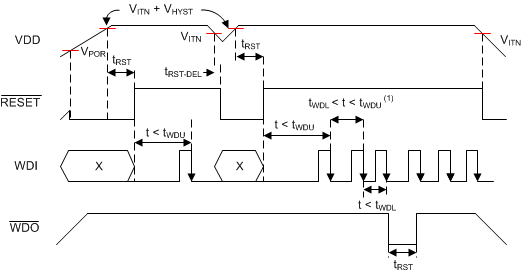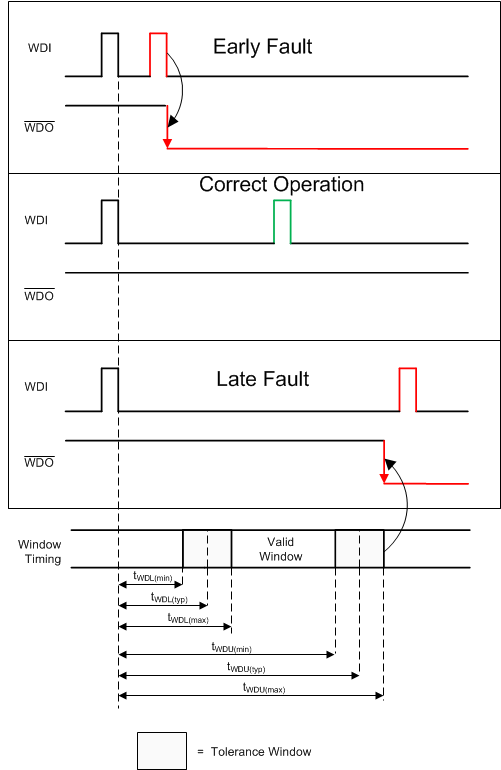ZHCSFP5 November 2016 TPS3852
PRODUCTION DATA.
- 1 特性
- 2 应用
- 3 说明
- 4 修订历史记录
- 5 Pin Configuration and Functions
- 6 Specifications
- 7 Detailed Description
- 8 Application and Implementation
- 9 Power Supply Recommendations
- 10Layout
- 11器件和文档支持
- 12机械、封装和可订购信息
6 Specifications
6.1 Absolute Maximum Ratings
over operating free-air temperature range (unless otherwise noted)(1)| MIN | MAX | UNIT | ||
|---|---|---|---|---|
| Supply voltage range | VDD | –0.3 | 7 | V |
| Output voltage range | RESET, WDO | –0.3 | 7 | V |
| Voltage ranges | SET1, WDI, MR | –0.3 | 7 | V |
| CWD, CRST | –0.3 | VDD + 0.3(3) | V | |
| Output pin current | ±20 | mA | ||
| Input current (all pins) | ±20 | mA | ||
| Continuous total power dissipation | See Thermal Information | |||
| Temperature | Operating junction, TJ (2) | –40 | 150 | °C |
| Operating free-air temperature, TA (2) | –40 | 150 | °C | |
| Storage, Tstg | –65 | 150 | °C | |
(1) Stresses beyond those listed under Absolute Maximum Ratings may cause permanent damage to the device. These are stress ratings only, which do not imply functional operation of the device at these or any other conditions beyond those indicated under Recommended Operating Conditions. Exposure to absolute-maximum-rated conditions for extended periods may affect device reliability.
(2) Assume that TJ = TA as a result of the low dissipated power in this device.
(3) The absolute maximum rating is VDD + 0.3 V or 7.0 V, whichever is smaller.
6.2 ESD Ratings
| VALUE | UNIT | |||
|---|---|---|---|---|
| V(ESD) | Electrostatic discharge | Human-body model (HBM), per ANSI/ESDA/JEDEC JS-001(1) | ±1000 | V |
| Charged-device model (CDM), per JEDEC specification JESD22-C101(2) | ±500 | |||
(1) JEDEC document JEP155 states that 500-V HBM allows safe manufacturing with a standard ESD control process.
(2) JEDEC document JEP157 states that 250-V CDM allows safe manufacturing with a standard ESD control process.
6.3 Recommended Operating Conditions
over operating free-air temperature range (unless otherwise noted)| MIN | NOM | MAX | UNIT | ||
|---|---|---|---|---|---|
| VDD | Supply pin voltage | 1.6 | 6.5 | V | |
| VSET1 | SET1 pin voltage | 0 | 6.5 | V | |
| VMR | MR pin voltage | 0 | 6.5 | V | |
| CCWD | Watchdog timing capacitor | 0.1(1) | 1000(1) | nF | |
| CWD | Pull-up resistor to VDD | 9 | 10 | 11 | kΩ |
| RPU | Pull-up resistor, RESET and WDO | 1 | 10 | 100 | kΩ |
| IRESET | RESET pin current | 10 | mA | ||
| IWDO | Watchdog output current | 10 | mA | ||
| TJ | Junction Temperature | –40 | 125 | °C | |
(1) Using a CCWD capacitor of 0.1 nF or 1000 nF gives a tWDU(typ) of 62.74 ms or 77.45 seconds, respectively.
6.4 Thermal Information
| THERMAL METRIC(1) | TPS3852 | UNIT | |
|---|---|---|---|
| DRB (VSON) | |||
| 8 PINS | |||
| RθJA | Junction-to-ambient thermal resistance | 50.7 | °C/W |
| RθJC(top) | Junction-to-case (top) thermal resistance | 51.6 | °C/W |
| RθJB | Junction-to-board thermal resistance | 25.8 | °C/W |
| ψJT | Junction-to-top characterization parameter | 1.3 | °C/W |
| ψJB | Junction-to-board characterization parameter | 25.8 | °C/W |
| RθJC(bot) | Junction-to-case (bottom) thermal resistance | 7.1 | °C/W |
(1) For more information about traditional and new thermal metrics, see the Semiconductor and IC Package Thermal Metrics application report.
6.5 Electrical Characteristics
At VITN + VHYST ≤ VDD ≤ 6.5 V over the operating temperature range of –40°C ≤ TA, T J ≤ 125°C, unless otherwise noted. The open-drain pull-up resistors are 10 kΩ for each output. Typical values are at TJ = 25°C.| PARAMETER | TEST CONDITIONS | MIN | TYP | MAX | UNIT | |
|---|---|---|---|---|---|---|
| GENERAL CHARACTERISTICS | ||||||
| VDD(3) | Supply voltage | 1.6 | 6.5 | V | ||
| IDD | Supply Current | 10 | 19 | µA | ||
| RESET FUNCTION | ||||||
| VPOR(2) | Power-on reset voltage | IRESET = 15 µA, VOL(MAX) = 0.25 V | 0.8 | V | ||
| VUVLO(1) | Under Voltage Lock Out Voltage | 1.35 | V | |||
| VITN | Undervoltage threshold accuracy, entering RESET | VDD falling | VITN – 0.8% | VITN + 0.8% | ||
| VHYST | Hysteresis voltage | VDD rising | 0.2% | 0.5% | 0.8% | |
| IMR | MR pin internal pull-up current | VMR = 0 V | 500 | 620 | 700 | nA |
| WINDOW WATCHDOG FUNCTION | ||||||
| ICWD | CWD pin charge current | CWD = 0.5 V | 337 | 375 | 413 | nA |
| VCWD | CWD pin threshold voltage | 1.192 | 1.21 | 1.228 | V | |
| VOL | RESET, WDO output low | VDD = 5 V, IRESET = IWDO = 3 mA |
0.4 | V | ||
| ID | RESET, WDO output leakage current, open-drain | VDD = VITN + VHYST, VRESET = VWDO = 6.5 V |
1 | µA | ||
| VIL | Low-level input voltage (MR, SET1) | 0.25 | V | |||
| VIH | High-level input voltage (MR, SET1) | 0.8 | V | |||
| VIL(WDI) | Low-level input voltage (WDI) | 0.3 × VDD | V | |||
| VIH(WDI) | High-level input voltage (WDI) | 0.8 × VDD | V | |||
(1) When VDD falls below UVLO, RESET is driven low.
(2) When VDD falls below VPOR, RESET and WDO are undefined.
(3) During power on, VDD must be a minimum 1.6 V for at least 300 µs before RESET correlates with VDD.
6.6 Timing Requirements
At VITN + VHYST ≤ VDD ≤ 6.5 V over the operating temperature range of –40°C ≤ TA, T J ≤ 125°C, unless otherwise noted. The open-drain pull-up resistors are 10 kΩ for each output. Typical values are at TJ = 25°C.| MIN | TYP | MAX | UNIT | |||
|---|---|---|---|---|---|---|
| tINIT | CWD pin evaluation period | 381 | µs | |||
| Minimum MR, SET1 pin pulse duration |
1 | µs | ||||
| Startup delay | 300 | µs | ||||
| RESET FUNCTION | ||||||
| tRST | Reset timeout period | 170 | 200 | 230 | ms | |
| tRST-DEL | VDD to RESET delay | VDD = VITN + VHYST + 2.5% | 35 | µs | ||
| VDD = VITN - 2.5% | 17 | |||||
| tMR-DEL | MR to RESET delay | 200 | ns | |||
| Watchdog Function | ||||||
| tWDL | Window watchdog lower boundary | CWD = NC, SET1 = 0(1) | Watchdog disabled | |||
| CWD = NC, SET1 = 1(1) | 680 | 800 | 920 | ms | ||
| CWD = 10kΩ to VDD, SET1 = 0(1) |
Watchdog disabled | |||||
| CWD = 10kΩ to VDD, SET1 = 1(1) |
1.5 | 1.85 | 2.2 | ms | ||
| tWDU | Window watchdog upper boundary | CWD = NC, SET1 = 0(1) | Watchdog disabled | |||
| CWD = NC, SET1 = 1(1) | 1360 | 1600 | 1840 | ms | ||
| CWD = 10kΩ to VDD, SET1 = 0(1) |
Watchdog disabled | |||||
| CWD = 10kΩ to VDD, SET1 = 1(1) |
9.3 | 11.0 | 12.7 | ms | ||
| tWD-setup | Setup time required for part to respond to changes on WDI after being enabled | 150 | µs | |||
| Minimum WDI pulse width | 50 | ns | ||||
| tWD-DEL | WDI to WDO Delay | 50 | ns | |||
(1) SET1 = 0 means VSET1 < VIL, SET1 = 1 means VSET1 > VIH
6.7 Typical Characteristics
All Typical Characteristics curves are taken at 25°C with, 1.6 V ≤ VDD ≤ 6.5 V unless other wise noted.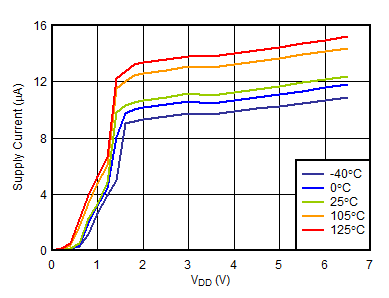
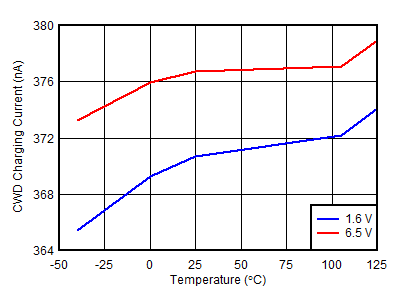
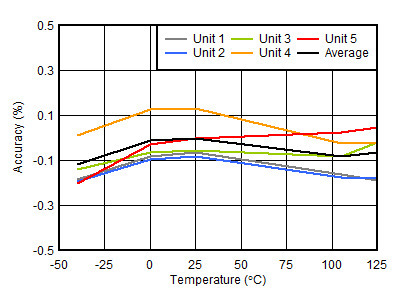
| TPS3852G33 | ||
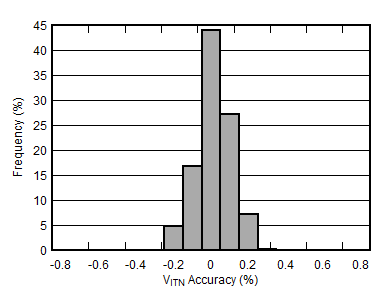
| Includes G and H versions; with 3.3-V nominal monitored voltage; | ||
| total units = 15,536 |
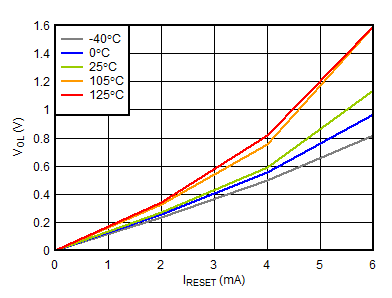
| VDD = 1.6 V |
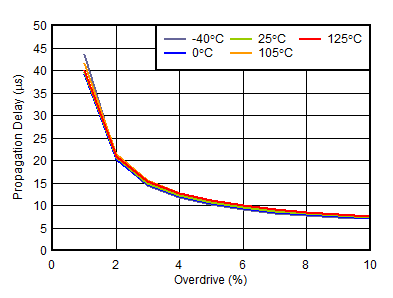
| TPS3852G33 entering undervoltage |
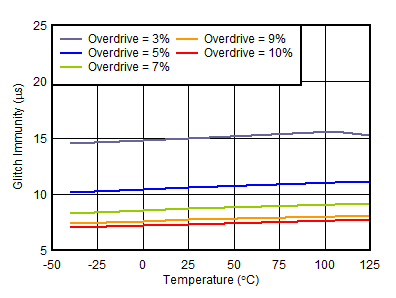
| VITN = 3.168 V |

| VDD = 1.6 V |
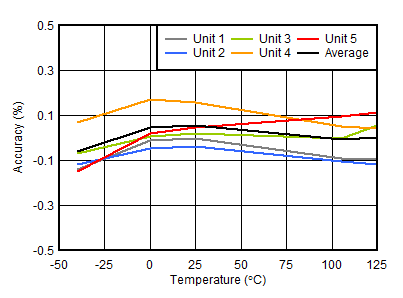
| TPS3852G33 |
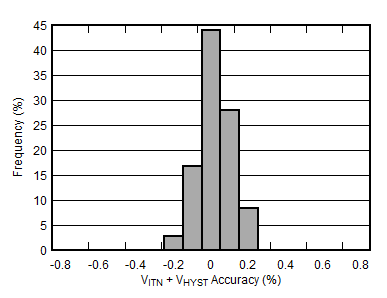
| Includes G and H versions; with 3.3-V nominal monitored voltage; | ||
| total units = 15,536 |
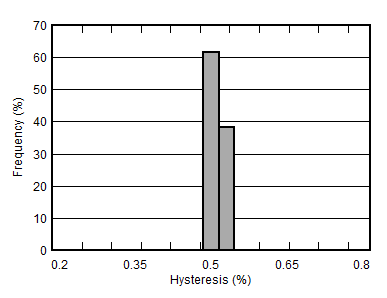
| Includes G and H versions; with 3.3-V nominal monitored voltage; | ||
| total units = 15,536 |
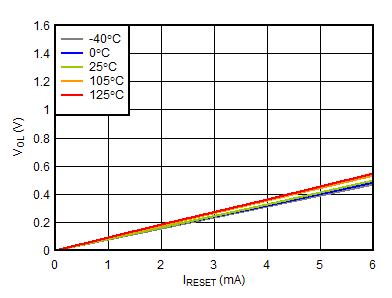
| VDD = 6.5 V |
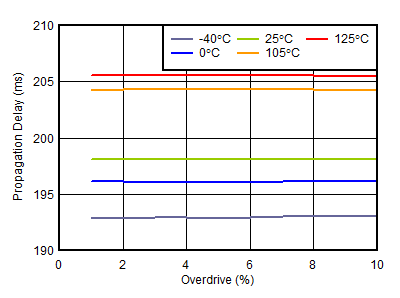
| TPS3852G33 exiting undervoltage |
